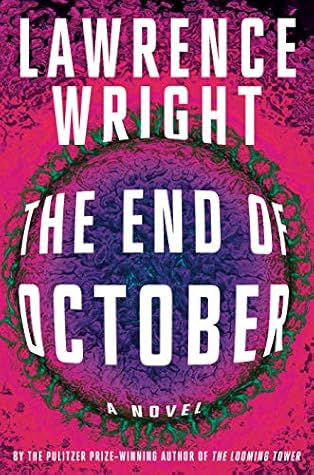More on this book
Community
Kindle Notes & Highlights
even voice. “I’m talking about saving civilization.”
But there was no other way of dealing with Putin. One had to be resolute and maybe even a little crazy.
“Lieutenant Commander Bartlett, ma’am. Public Health Service.” She was standing in for Health and Human Services.
The first slide was a spiky round ball, tinted in red and green, looking like a Christmas ornament. “When you say ‘flu,’ this is what we’re dealing with,” Bartlett said.
They calculated the attack rate as about 70 percent, meaning that seven out of ten people exposed in the Kongoli camp contracted the disease.
Tildy found it hard to breathe. She immediately thought how poorly prepared the country was.
“We’re talking about a shutdown of the entire transportation system,” Commerce said accusingly. “Exactly,” the tone-deaf Bartlett said, as if Commerce were proposing a wonderful idea. “As much as possible, we need to urge people to shelter in place. It would be
The world outside the space they inhabited was dimly aware of the looming peril, but the
dread the two men carried in their hearts would be shared and spread, and soon everyone would know the solemn contest that humanity was facing.
The crown prince laughed. “But this is the flu!” he said. “We have the flu every year! We all get the flu, even the royal family!”
“You tell us we have no choice. You frighten us with these theoretical outcomes and demand that we believe you. But we have many other important responsibilities. We cannot do everything at once. These claims must be investigated.”
today. We shouldn’t underestimate the ability of any terrorist group to be able to manufacture novel viruses.” “I just can’t imagine a real scientist doing such a thing,” said Marco. Henry said nothing. That was not a part of his life he cared to share.
farm. Take a couple month’s worth of groceries. Don’t see anybody. Don’t even touch the mail. Just hunker down and wait for me.”
“We have to offer them some hope,” Majid said. “Some reason to accept their suffering.”
In desperation, doctors obtained plasma from a convalescent patient who had recovered from the same infection several months before. The driver was given three 200-milliliter transfusions over two days. “Within thirty-two hours, the viral load was undetectable,” Marco said.
new plague. Mayor Jackson’s death from Kongoli flu, ten days into the epidemic, was a demoralizing blow from which the city never fully recovered. And the contagion spread.
Mary Lou Shaughnessy was a field veterinarian with the regional U.S. Department of Agriculture office in St. Paul, Minnesota.
part of a militia group, known as the Minnesota 3 Percenters, a name drawn from the assertion that only 3 percent of American
colonists took up arms against the British Empire during the American Revolution.
It was easy to spot the gate to his farm by the upside-down Stars and Stripes on the flagpole—a signal of distress that annoyed nearly everybody in the county.
because we have no stockpile of essential medicines.
“—and that real progress is being made. I think we’ll leave it at that.” The vice president
“the good news is that, if we’re lucky, we could have an effective vaccine at scale in about six months, hopefully in time for the second wave.”
The silence was broken by a loud sneeze. Everyone gasped.
The chief scientist at Vektor in the Soviet era was Nikolai Ustinov. He was
studying Marburg, a member of the poorly understood family of diseases called filoviruses.
Ustinov.
Kanatzhan Alibekov, who had been the first deputy director of Biopreparat, an arm of the secret Soviet biowarfare program. Alibekov defected to the U.S. in 1992 and changed his name to Ken Alibek. A
“It’s just the smell of these weeds,” Maggie said, giving Jill an ironic glance. Peepers ran around in confusion,
“My mom’s a pothead.”
days: Why were some people immune to novel diseases that otherwise run rampant through populations?
“Reverence for Life affords me my fundamental principle of morality, namely, that good consists in maintaining, assisting and enhancing life, and that to destroy, to harm or to hinder life is evil.”
Henry’s blood type was O. So far nobody had figured out why blood type had anything to do with it.
a trait that defined him in Jill’s mind as no other did: his enormous capacity for love.
What leadership? Tildy thought. The president had been almost entirely absent in the debate about how to deal with the contagion, except to blame the opposing
party for ignoring public health needs before he took office.
man, “Did you ever hear of this group called Earth’s Guardians? My
“You’d think,” said Justice. “But their leader used to be in the government. Led a lot of hush-hush stuff at Fort Detrick. Then he got canned and went off to do some dirty work with a private contractor.” “A scientist?” Tildy asked. “Yeah, a microbiologist. Named Jürgen Stark.”
be—the powerful, the rich, and the celebrated would be saved. She realized she was being naive.
Of course this was how it was bound to be. This is the country we’ve become.
“She doesn’t need to be here.” “She’s waiting for the first lady,” the general said. “Well, she’s not coming. I guess she doesn’t trust you people.
siege. The absence of truth and the breakdown of trust opened the door to terror, and that was tearing society apart.
pastor—Jill knew whom she meant, at the Glenn Memorial United Methodist Church—to
“I love you, Mom,” she said, tearing up. “I know you do.” Jill spooned another bite of vanilla ice cream into her mother’s mouth.


